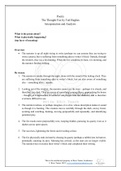Poetry
The Thought Fox by Ted Hughes
Interpretation and Analysis
What is the poem about?
What is physically happening?
(top layer of meaning)
Overview
• The narrator is up all night trying to write (perhaps we can assume they are trying to
write a poem), but is suffering from something akin to writer’s block. Outside, through
the window, they see a fox hunting. When the fox completes its hunt, it is morning, and
the narrator finishes writing.
By stanza
1. The narrator is awake through the night, alone with the sound of the ticking clock. They
are suffering from something akin to writer’s block, but are also aware of something
else – something alive – nearby.
2. Looking out of the window, the narrator cannot see the stars – perhaps it is cloudy, and
therefore very dark. They are aware of something coming closer, approaching the house
– though, as it approaches, it seems to sink deeper into the shadows, and is therefore
evermore difficult to see.
3. The narrator realises, or perhaps imagines, it is a fox, whose description makes it sound
as though it is hunting. The creature moves carefully through the dark, snowy forest,
scenting and watching, hunting, moving purposefully and repeatedly, and identifying
potential prey.
4. The fox tracks more purposefully now, keeping hidden, pursuing its quarry even as it
dashes across open spaces.
5. The sun rises, lightening the forest and revealing colour.
6. The fox physically ends its hunt by chasing its quarry (perhaps a rabbit) into its burrow,
potentially catching its prey. Morning has arrived, so the stars are no longer visible.
The narrator has overcome their writer’s block and completed their writing.
This is the intellectual property of Ross Turner Academics
© Ross Turner 2023 | www.rossturneracademics.com
, What else might the poem be about?
What is metaphorically happening?
What is the purpose/theme/message of the poem?
What ideas might the poet have wanted the reader to consider?
(deeper layers of meaning; more complex interpretations)
Overview
• Perhaps the poem as a whole is a metaphor for the process of thought/the process of
writing/a completed poem (if we assume for ease that the narrator is writing a poem),
with the fox (and all its related connotations) representing thoughts/ideas/the poem
itself.
• Perhaps, throughout the entire poem, the physical (specific, concrete details), represents
the abstract (thoughts, ideas, the poem, etc).
• Amongst other things, such as time and loneliness, shadows and darkness are also
prevalent throughout the poem – perhaps the shadows represent the poet knowing what
they want to write, but simply not how they want to write it (the goal is obvious, but the
process (perhaps of clear thought) is concealed.
Connotations relating to the metaphor
• Foxes can have quite negative connotations – thieving, shady, clever, cunning, wily,
shy, sly, sneaky, etc.
• Perhaps this is representative of how ideas don’t just appear, but instead gradually come
into being; thoughts come quietly over the course of the night – they slink into sight,
like the fox slinks out of the shadows.
Comparative connotations
Qualities of fox Qualities of thoughts/poem
Wily, shy, clever, cunning, etc. Don’t come easily; difficult to obtain.
Doesn’t want to crystallise (the poem
won’t take full form easily).
Different animals represent different things, so a different animal might not accurately
represent the qualities of thoughts, or of writing, or of a poem in the appropriate way that a fox
does.
For example, if this poem were ‘The Thought Hippo’, it might make the whole concept seem
humorous, rather than introspective.
This is the intellectual property of Ross Turner Academics
© Ross Turner 2023 | www.rossturneracademics.com





